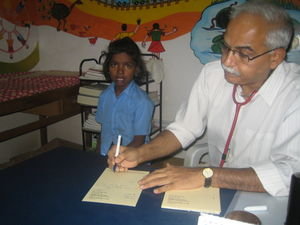Advertisement
Published: October 24th 2007

 Dr. Ramakrishnan
Dr. Ramakrishnan
Local PediatricianDay 4 Visit to local Pediatrician Office.
It is late in the afternoon and the air is gradually cooling. The waiting room of Dr. Ashok's office is filled with parents and their young children. The patients are seen one after the other, with very little wait time. Before embarking on the first field trip for data collection in regards to malnutrition in the Balwadids, consult a local pediatrician who has worked closely with the NGO's health program.
After a few 15 minutes of waiting a lady with a white sary who is probably the nurse ushers me into the office. Dr. Ashok takes a good amount of time in the midst of his busy schedule to describe the problem of malnutrition in the tribal belt of Udaipur.
The first thing I learn that poverty contrary to what is widely believed is not the primary contributor. The most important variable in in regards to nutrition status in children, he said, is adequate breast feeding. Mother's breast milk provides the most balanced nutrition in relation to protein and fat content, vitamins and minerals. Those children who for any reason are deprived breast milk are prone to developing malnutrition.
Reasons
include, lack of initial lactation and early introduction of bottle to compensate for it, maternal illness, maternal death, maternal absence, and inadequate spacing of birth, in which case the older child still breast feeding.
Substitutes are often inadequate, such that it is usually diluted cow's milk; these are already diluted on purchase, and once boiled a fat layer is lost further decreasing the available calories.
Secondary form of malnutrition, IE, it is related to another factor, is more common. A common etiology in the region is diarrhea and measles at infancy. The latter is highly preventable but a substantial number are still not vaccinated, thus becoming vulnerable. When a child has diarrhea the misconception by the parents is that the child should not be fed, thinking that feeding would worsen the child's condition. They only hydrate the child using oral re-hydration supplements. As the diarrhea runs its course the child looses considerable weight.
Thus the strategy to battle the primary contributors to malnutrition is to strongly encourage breast feeding, and making adequate substitutes available. This should be done in culturally sensitive manner as most in the tribal belt are vegetarians.
Awareness building in care givers in relation to adequate food intake during bouts of diarrhea in addition to the administration of oral re-hydration supplements is of paramount importance.
Advertisement
Tot: 0.121s; Tpl: 0.045s; cc: 9; qc: 61; dbt: 0.0618s; 1; m:domysql w:travelblog (10.17.0.13); sld: 1;
; mem: 1.1mb

 Dr. Ramakrishnan
Dr. Ramakrishnan